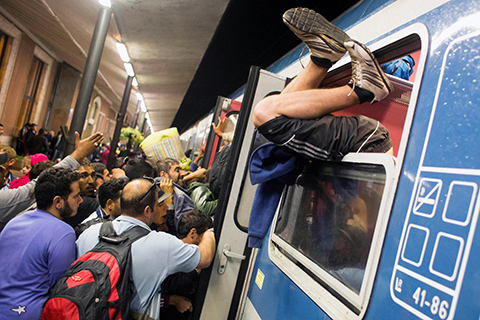BELI MANASTIR, Croatia: Thousands of migrants sought their way through a chaotic maze of rumours and proliferating border controls in the western Balkans yesterday. In the latest chapter in the EU's escalating refugee crisis, Croatia, Hungary and Slovenia tussled over how to cope with a wave of refugees desperate to reach northern Europe. The European Union, meanwhile, sketched plans to boost aid to encourage Syrians in Turkey to stay put rather than join the exodus.
In a new hurdle aimed at stemming the inflow, Hungary said it had completed a 41-km barbed-wire barrier along part of its frontier with fellow EU member Croatia. It "was finished overnight Friday," defence spokesman Attila Kovacs told AFP in Budapest. The remaining 330 km of the border runs roughly along the Drava river, which is difficult to cross. The new barrier adds to a barbed-wire fence that Hungary set down along its frontier with Serbia, and backed with laws threatening illegal migrants with jail.
That move sparked fierce condemnation internationally and forced the migrant flow towards neighbouring Croatia. Reversing an open-door policy, Croatia on Friday said it was swamped and redirected the migrants back to Hungary. Croatian Foreign Minister Vesna Pusic on Friday said that Zagreb and Budapest had agreed to allow "vulnerable migrants" to cross. Austrian police said 6,700 people had arrived on its border from Hungary, and as many as 10,000 were expected by the end of the day. They were then taken by bus or special train to various reception centres around Austria, police said. Another branch of the refugee flow has been through Croatia and to Slovenia.
Hundreds of migrants spent the night in the open on the Croatian side of the border at Bregana, state-run HRT television reported. At Harmica, several dozen migrants faced off with a cordon of riot police on the frontier bridge, demanding that Slovenian police let them enter the country, an AFP reporter saw. Late Friday, police used tear gas against several hundred migrants, some with children, who had sought to push through the police line.
The clash happened shortly after Slovenian Prime Minister Miro Cerar said the small country might consider creating "corridors" for refugees wanting to reach northern Europe if they continue arriving in large numbers. Slovenian police said yesterday that 1,287 had arrived as of midnight Friday, of which 483 were from Afghanistan, 470 from Syria and 126 from Iraq.
Migrant Flow
With no let-up in the flow of people desperate to find shelter in Europe from war and misery, new figures showed the EU received almost a quarter of a million asylum requests in the three months to June. The International Organization for Migration (OIM) also said nearly 474,000 people had so far this year braved perilous trips across the Mediterranean to reach Europe. Italy's coastguard on Saturday said it was coordinating 20 rescue operations in the Mediterranean that had picked up 4,540 people.
The continent's biggest migratory flow since the end of World War II has dug a deep rift between western and eastern EU members, with Hungary leading the hardline group. Germany, Europe's biggest economy, is the great magnet for the refugees, many of whom are Syrians. On Friday, Berlin warned it could invoke EU's majority voting system to force reluctant states to accept quotas of migrants.
Another worry is over the fate of the Schengen agreement, a pillar of the European project that allows borderless travel between member states. In addition to fences or restrictions on parts of the border between Croatia, Hungary and Slovenia, there are identity checks that Germany, Austria and Slovakia have reimposed on parts of their borders, and Poland and The Netherlands are considering whether to follow suit. EU interior ministers are to meet again on Tuesday, followed by an emergency summit on Wednesday.
Turkish Solution?
Meanwhile, European Commissioner Johannes Hahn said yesterday the EU was earmarking aid of "up to one billion euros" ($1.13 billion) to encourage Syrian refugees in Turkey to stay there rather than join the outpouring of people heading to Europe. The money will "help Turkey to deal with this challenge and (give) people (a) perspective to stay in the region in order to return back into their home region, home towns, as soon as this is possible," Hahn said. The money will be taken from funds allocated for Turkey, Hahn said in a visit to a migrant reception centre at Gevegilja, in Macedonia.
Of the more than four million Syrians who have fled their country, nearly half have sought shelter in Turkey, while more than a million are now living in Lebanon and nearly 630,000 in Jordan. The UN's World Food Programme (WFP) has said severe underfunding has forced it to halve its food assistance to 1.3 million of the refugees. - AFP
.jpg)




